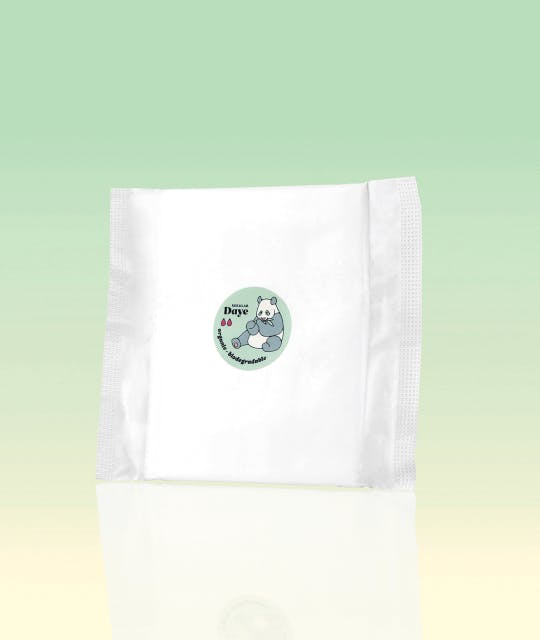Your basket
Your basket is currently empty.
£-1.00
£-1.00
£-1.00
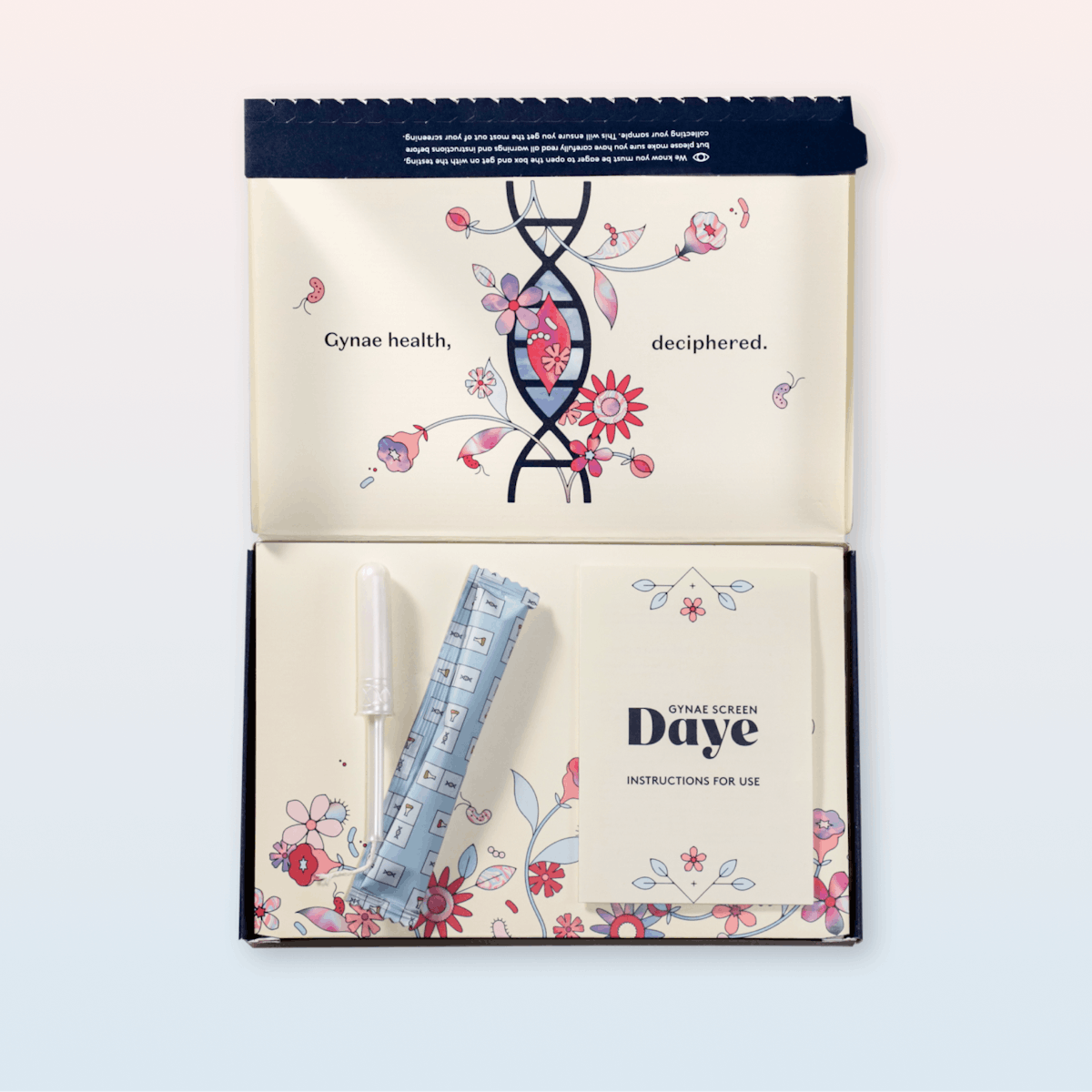
Daye STI Screen
Get results you can trust for common STIs like Chlamydia, Gonorrhoea, and Trichomoniasis with a non-invasive at-home tampon screen.
Taking control of your sexual health has never been easier with Daye's innovative Diagnostic Tampon. All you have to do is insert the tampon, wear it for 20 minutes, and remove. You don’t need to be on your period, which means you can be menopausal, pregnant or on long-term contraception. Ship your return box, and our accredited labs will process your sample.
We use sophisticated molecular PCR - the most accurate method available for detecting STIs and other vaginal infections. Your in-depth results will be available online in just 5-10 days. In addition to your screening report, you'll get access to virtual consultations with sexual health experts, discreet prescription treatment options, and personalised lifestyle recommendations, tailored to your needs.
Once your Daye Diagnostic Tampon sample arrives at our state-of-the-art laboratory, our team of experts will process it. You can expect your personalised results report to be available online within just 5-10 days. We'll send you an email notification as soon as your results are ready to view securely in your private Daye account dashboard. With Daye, you can trust that your STI screening results will be delivered quickly, accurately, and discreetly.
Daye uses tampons for at-home screening because they provide a non-invasive, familiar, and comfortable method for patients to collect comprehensive samples from their entire vaginal canals. Studies published in the Journal of Human Reproduction and BMC Women's Health have shown that Daye tampons offer improved sensitivity for detecting infections compared to the traditional swab. By using a tampon for at-home screening, you can trust the sample you have collected is reliable.
Who is this service for?
If you are sexually active
If you are sexually active
Regular STI screening is crucial for everyone. Our Diagnostic Tampon ensures you in control of your sexual health.
Screen 1-2 times per year or when you have a new sex partnerIf you have fertility concerns
If you have fertility concerns
STIs are a leading cause of preventable infertility. Screen proactively to avoid long-term harm from untreated STIs.
Screen as you prepare to conceiveIf your partner is STI-positive
If your partner is STI-positive
Test with ease from the comfort of your home. If you test positive, Daye provides discreet prescription treatment deliveries.
Screen two weeks after contact with an STI-positive partnerDetect vaginal infections like Thrush & Bacterial Vaginosis (BV)
Understand if you have an STI or are at a higher risk of UTIs
Determine if your IVF cycle is less likely to be successful
Check for fertility-inhibiting STIs

Wait, the vaginal micro-what?
Like your gut, your vagina is home to billions of bacteria (some good, some bad). These make up your vaginal microbiome. When it doesn’t contain enough good bacteria, you’re at greater risk of vaginal dryness, fertility challenges, as well as infections like STIs, thrush and BV.
Which pathogens do we test for?
With cutting-edge PCR technology for unparalleled accuracy, Daye tampons collect more vaginal fluid than a standard swab and cover the whole vaginal canal.
Chlamydia
A very common STI caused by a bacterial infection.
*Only available with the STI Screen
Gonorrhoea
An STI that can affect both men and women.
*Only available with the STI Screen
Trichomoniasis
One of the most common STIs worldwide.
*Only available with the STI Screen
Mycoplasma/ Ureaplasma
According to studies, can affect fertility.
Lactobacilli
Good bacteria in your vaginal microbiome.
Anaerobic bacteria
Cause infections like bacterial vaginosis (BV).
Candida
Candida is a fungus which affects 75% of women.
HPV screening
Detects the presence of high risk human papillomavirus strains.
*Only available with the HPV Screen
Herpes Type I & II
Can potentially infect another person.
*Only available with the STI Screen
What is included with every screening?
Order your test & get a kit delivered to your door
The kit will arrive at your doorstep in a discreet package. No more awkward queuing in clinic waiting rooms.
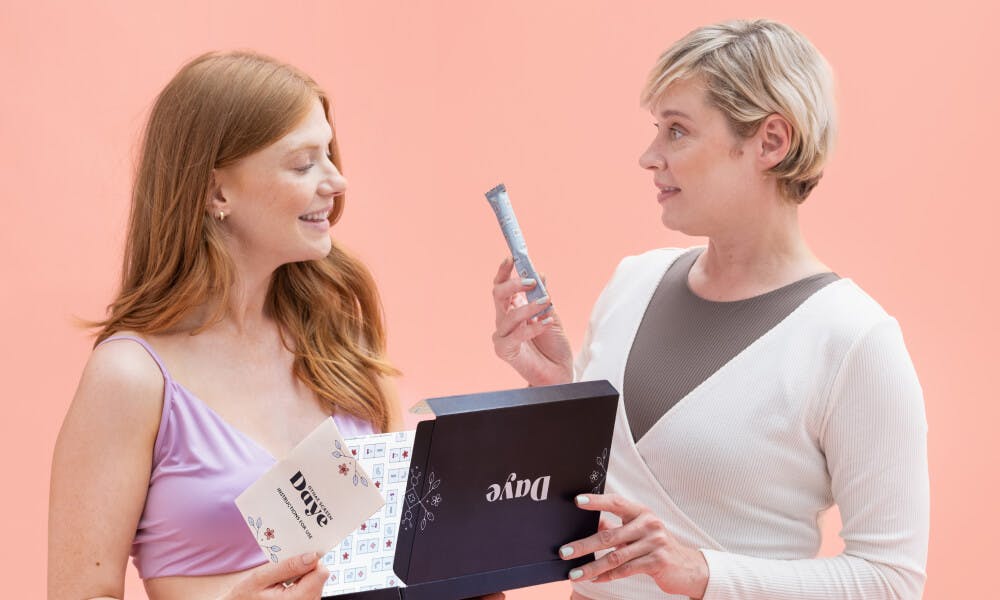
Collect and send off your sample to our accredited lab
Activate your kit with your unique code, complete a short symptom questionnaire, and send your sample - we'll handle the rest.

Get detailed, actionable results.
We never want to leave you stuck with a set of confusing or potentially troubling results. If you test positive for an STI, one of our sexual health nurses will provide a free consultation.

Connect with vetted specialists, & get prescription treatments to your doorstep.
After the screening, you can set up virtual consultations with our vetted sexual health, fertility, and menopause experts. You can also get treatments discreetly delivered to your door.

Discover simple changes you can implement to take control of your health
Every report includes science-backed, personalised insights into lifestyle changes you can adopt to further enhance your health.

Be your own health hero
Got an infection that keeps coming back?
Got an infection that keeps coming back?
Mainstream treatments for BV and thrush can put us at a higher risk of recurrent infections.
Learn moreOwn your fertility journey.
Own your fertility journey.
A healthy microbiome is vital for successful fertilisation, implantation, and embryo development.
Learn moreWorried about STIs?
Worried about STIs?
As many as 70% of female STIs are asymptomatic, making proactive screening essential.
Learn more
Developed by experts
“Having a healthy and balanced microbiome is important...”
Having a healthy and balanced microbiome is important for the successful fertilisation, implantation and embryo development. It is thought to reduce antisperm immunity — an immune system which attacks sperm.
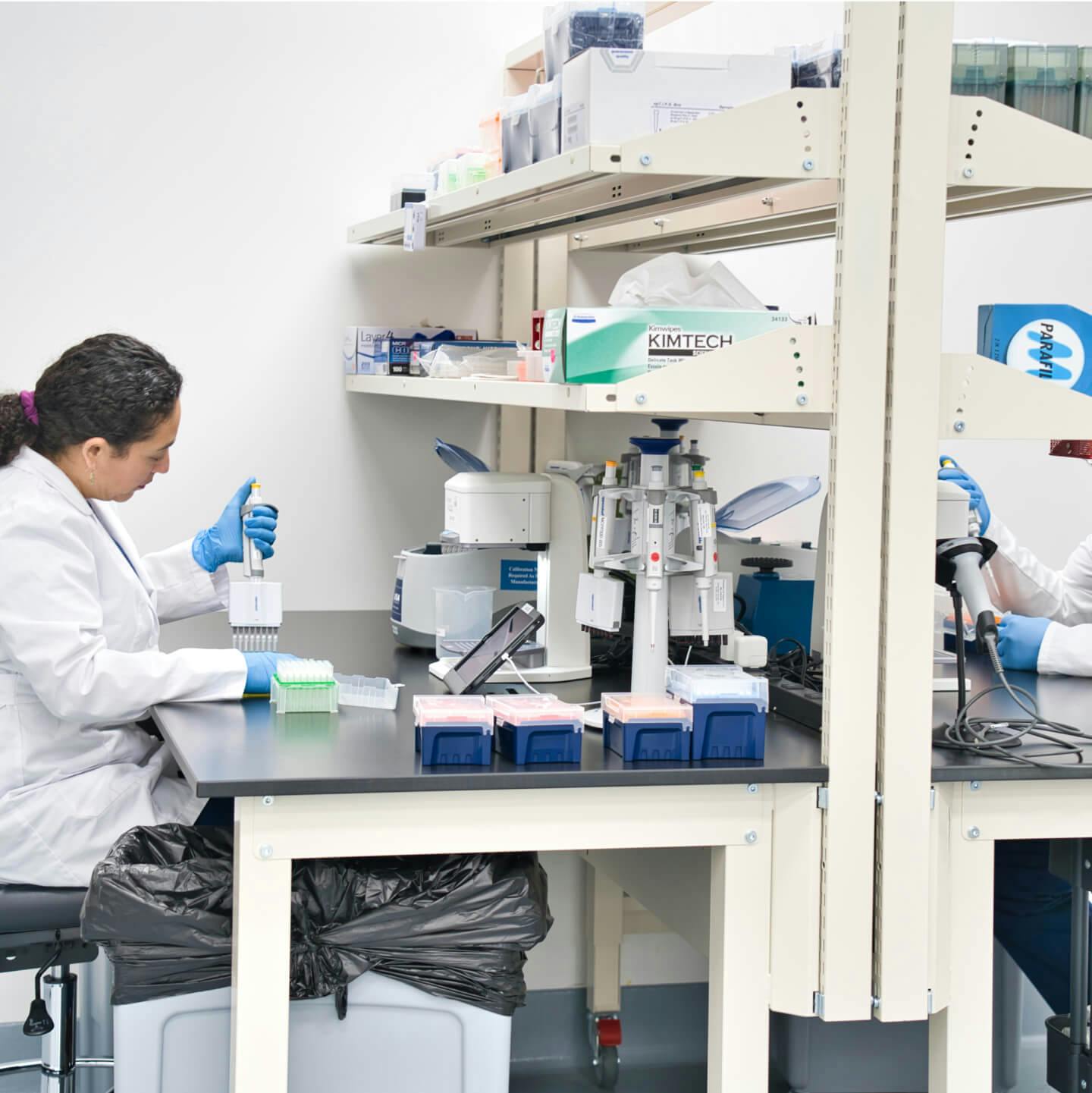
Developed by experts
Our collaborator in advancing biotechnology
Our skilled lab technicians prioritiсe exceptional results. With a focus on quality, we excel in biospecimen handling, clinical testing, and troubleshooting.
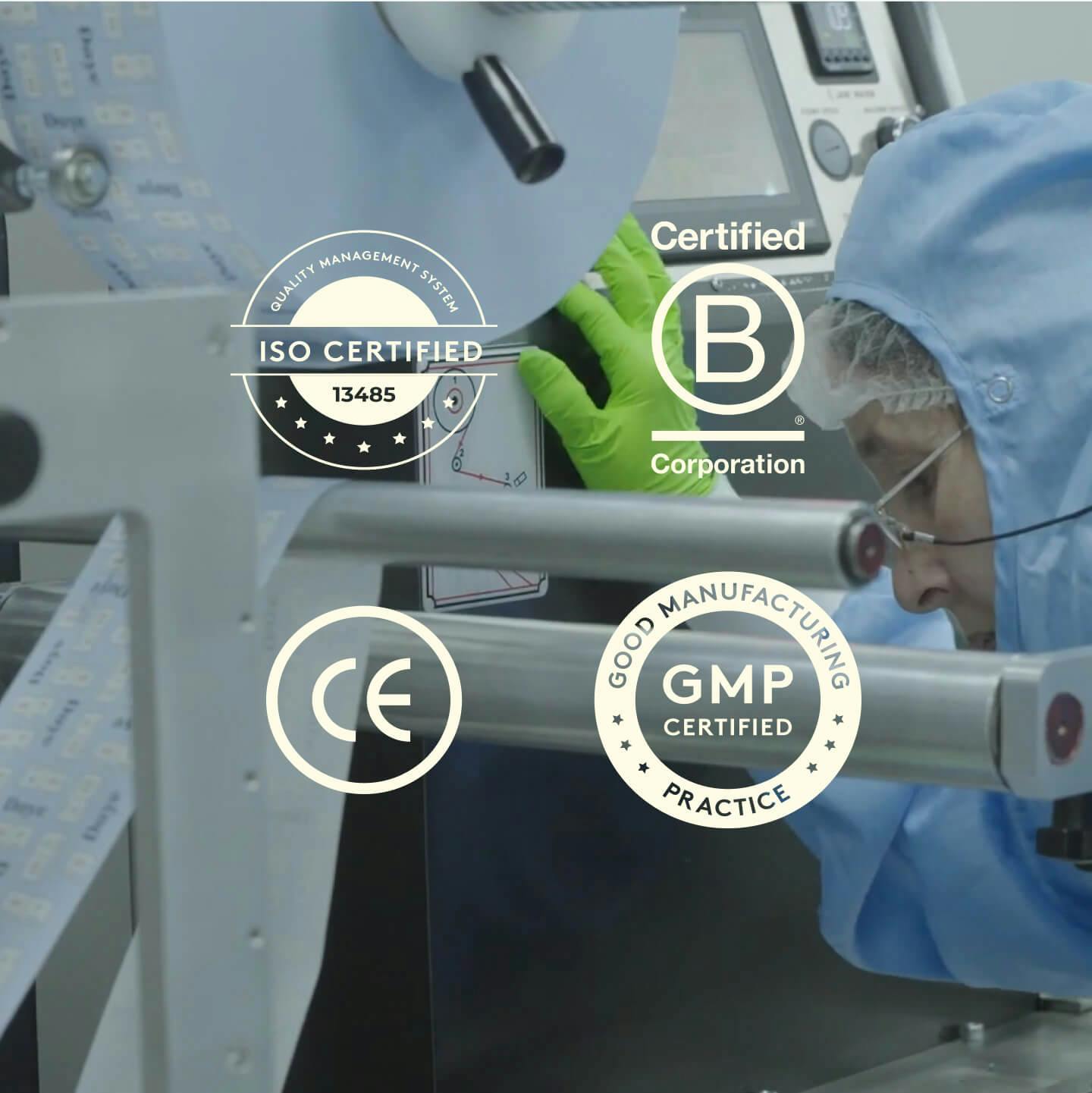
Developed by experts
We’re raising the standards of gynae products
To guarantee we deliver the safest, most effective products possible, we have independent groups audit Daye to confirm compliance with top industry quality standards.
Choose a screen that works for you
STI + Microbiome + HPV Screen
£257
What we test for:
Gonorrhea
Chlamydia
Trichomoniasis
Mycoplasma genitalium
Lactobacilli
Common BV related bacteria
Candida
Mycoplasma hominis
Ureaplasma
HPV16
HPV18
12 other high-risk HPV types
STI + Microbiome Screen
£188
What we test for:
Lactobacilli
Common BV related bacteria
Candida
Mycoplasma hominis
Ureaplasma
Chlamydia
Gonorrhea
Trichomoniasis
Mycoplasma genitalium
STI Screen
What we test for:
Chlamydia
Gonorrhea
Trichomoniasis
Mycoplasma genitalium
See our Founder’s results!
Wondering what we test for, and what results look like? Enter your email below and Valentina, our Founder, will send you her screening report.
By entering your email above you agree to receive marketing emails and promotions from Daye.
Frequently asked questions
Still have questions? Read all of our FAQs.
Think of it as the immune system to your reproductive tract. It contains good bacteria (lactobacilli) and disruptive microorganisms (yeasts, viruses). A healthy vaginal microbiome is one where the good bacteria keep the disruptive ones in check, preventing them from growing out of control and causing an infection. A balanced microbiome has been linked to a lower risk of vaginal infections, including STIs.
There are several studies that show the correlation between having a healthy vaginal microbiome and a lower risk of getting vaginal infections like thrush and BV, a lower risk of contracting STIs, improved fertility and lower risks of miscarriage and pre-term birth, and a lower risk of developing gynaecological cancers. You can find more study references in your test results.The tampon offers a non-invasive, familiar method of obtaining a testing sample that makes the screening experience at home more comfortable and accessible. Further, tampons collect a comprehensive sample from the entirety of the vaginal canal, allowing for greater accuracy compared to traditional methods like swabs. The applicator enables smooth insertion in the vagina, and it also prevents the tampon from being contaminated during insertion.
Whatever your needs, we’ve got a package to suit you:
- STI Screening only (£89)
You’ll get tested for 6 of the most common sexually transmitted pathogens that cause infections: Chlamydia trachomatis, Neisseria Gonorrhoeae, Trichomonas vaginalis, and Mycoplasma Genitalium. In your report, you will also find a list of personalised, science-backed solutions & resources to help you manage your sexual health holistically.
- STI & Microbiome Screening (£129)
This panel includes all STI targets from the first package and more. We will analyse your microbiome for lactobacilli (the good, protective bacteria), Gardnerella vaginalis and Prevotella (anaerobic bacteria, linked to bacterial vaginosis), Candida (a yeast linked to thrush).
Our at-home online STI screening service is designed to help you detect and identify specific sexually transmitted infections (STIs) such as Chlamydia, Gonorrhoea, and Mycoplasma. However, it's important to note that our service provides a diagnostic indication based on the tests conducted, but it does not provide a definitive medical diagnosis.
The results you receive from our screening tests are valuable for assessing your risk and providing guidance on whether you should seek medical attention. If your test results indicate the presence of an STI, it means you may be at risk, and we strongly recommend that you consult with a healthcare professional for further evaluation, confirmation, and treatment. You can also connect with vetted specialists and sexual health experts through the Daye platform.
After your sample reaches our lab, it will be analysed within 5–10 days. You will receive an email notification when your results are ready for review, or if there was an issue with your sample.
After you receive your results, you will be able to book a consultation with a vetted specialist and order medication (subject to additional costs and availability). We also help you make lifestyle changes to improve your gynaecological health. Did you know that everything from your contraception and condoms to underwear materials, can impact the composition of good and bad bacteria in your vagina? Stay in the know with Daye's screen and invest in interventions that actually work.
Our test uses quantitative PCR technology, which is able to quantify the relative amounts of microorganisms in your microbiome. DNA-based methods (like PCR) can detect the DNA of all microorganisms found in the sample in an automated and highly accurate way. Studies have shown that PCR is the most accurate way of assessing the presence of STIs and the bacterial composition of the vaginal canal, surpassing standard and time-consuming methods, like microscopy. Furthermore, PCR-based screening can simultaneously detect multiple microorganisms in a single sample, allowing more comprehensive, yet affordable testing.
We use PCR (Polymerase Chain Reaction) technologies. These have revolutionised the screening and diagnosis of sexually transmitted infections (STIs) and vaginal infections, exemplifying a remarkable level of sophistication in molecular diagnostics. Unlike traditional methods that rely on culturing microorganisms, which can be time-consuming and less sensitive, PCR enables the detection of even trace amounts of genetic material from STI-causing pathogens. This high sensitivity allows for early and accurate identification of infections, reducing the risk of complications and transmission. Furthermore, PCR-based STI screening can simultaneously detect multiple pathogens in a single sample, streamlining the diagnostic process.
Samples are processed in a UKAS-accredited lab, using a CQC-audited lab methodology, and an MHRA registered, CE-marked diagnostic kit.
In order to take a sample at least 5 days must have passed since your last period ended. There are a few other requirements: no antibiotics or antifungals in the last 30 days, no douching, penetrative vaginal sex, and vaginally applied meds or creams in the 24 hours before. That will ensure your microbiome is in a stable state and that your results are not inconclusive.
Using the kit at home is super easy — you just need to insert the provided tampon, wear it for at least 20 minutes (and up to 8 hours), and then put it in the pouches you have received in the kit, and ship it back to us in the same box you received initially. We’ve prepared detailed video instructions which you’ll see after completing the test activation questionnaire in your account.
At Daye, we believe in building products that are rooted in scientific rigour. This means that we never want to get ahead of the science available. Like many other areas of gynaecological health, vaginal microbiome research has been underfunded for decades.
Vaginal microbiome screening is also not a common practice in clinical care today unless you go private.
A vaginal microbiome screen is used to understand the composition of bacteria in your vaginal microbiome. This can help you identify the presence of pathogens, which could be causing you recurrent vaginal infections (Candida, Gardnerella) or preventing you from becoming pregnant (Mycoplasma). If you're peri-menopausal or menopausal, you may want to increase your lactobacilli count so as to fight off vaginal dryness. If you have suffered recurrent UTIs, you may find a disrupted vaginal microbiome to be the cause. Knowing that you have a low lactobacilli count can also help you and your physician make informed decisions on your risk of a recurrent miscarriage or pre-term labour.
Not every physician, however, will recommend a vaginal microbiome screen, due to the method not being widespread yet. Please feel free to consult with your doctor before purchasing this test. If you require a simple bacterial vaginosis or candida test, you can get one for free from your local sexual health clinic.
It's also important to note that by testing your vaginal microbiome you are contributing to an increased global understanding of the best ways to detect and manage gynaecological health diseases, in turn bridging the gender gap in medical research and innovation.
Yes, our tampon-based STI screening is highly accurate and comparable to traditional testing methods. The samples collected are carefully analyzed in a certified laboratory to ensure reliable results.
Yes, we take your privacy seriously. Your personal information and test results are kept confidential. We follow strict privacy and data protection protocols to ensure your information remains secure.
No, it's best to avoid using the STI screening tampon during your menstrual period. You can use the tampon at other times during your cycle when you are not menstruating.
If your test results come back positive, it's important to seek medical advice and treatment promptly. You should contact a healthcare professional who can provide guidance on the appropriate steps to take for treatment and managing the infection.
Many STIs present without symptoms, but can cause serious complications is left untreated. If you are sexually active, it's recommended to get screened proactively every time you change a partner or once every year.
It is possible that if you test for STIs soon after being infected, your test may not find the infection. For this reason you may be advised to repeat the STI screening two weeks after the time when you were at risk of catching it.
- 2 tampons to take your sample — one to take your sample with and one for backup (double check the expiry date)
- A blue sterile pouch to keep the tampon sample safe from contamination
- A see-through shock-proof pouch to ensure the sample is protected on its way to the lab
- A 10 ml container with a transport medium liquid to protect your sample while on its way to the lab
- Step-by-step instructions on how to do the test + a card with the activation code
- For your convenience, the return label, which you can use to ship your sample back to our partner lab, is already attached to the outside of the box.
Don’t use the kit if any of these is missing or damaged. Get in touch with our customer care team and we’ll sort it out.
Relevant Research
Diagnosis of bacterial vaginosis on self-collected vaginal tampon specimens
2002 • P D J Sturm, P Moodley, G Nzimande
Results of the tampon and vaginal smears showed excellent agreement for both observers (Spearman >0.80). The overall sensitivity and specificity were 91.7% (95% CI: 81.6-96.5) and 79.3% (95% CI: 67.2-87.8), respectively, using the Amsel criteria as reference standard. The tampon provides a specimen for the combined diagnosis of non-ulcerative STIs and BV.
A Self-Administered Technique for the Detection of Sexually Transmitted Diseases in Remote Communities
1997 • Sepehr N. Tabrizi, Barbara Paterson, Christopher K. Fairley, Francis J. Bowden, Suzanne M. Garland
The detection of each organism was significantly greater by PCR in tampon-collected samples than by routine conventional methods (P < .01).
Pilot study of the utility and acceptability of tampon sampling for the diagnosis of Neisseria gonorrhoeae and Chlamydia trachomatis infections by duplex realtime polymerase chain reaction in United Kingdom sex workers
2010 • P T Kimmitt, S N Tabrizi, M Crosatti, S M Garland Frcpa, P C Schober, K Rajakumar, C A Chapman
Besides near-universal acceptability of tampon sampling, the tampon sampling–PCR approach described in this study appeared to have enhanced sensitivity compared with conventional testing.
Vaginal microbiome and sexually transmitted infections: an epidemiologic perspective
2011 • Rebecca M. Brotman
Vaginal bacterial communities are thought to help prevent sexually transmitted infections. Bacterial vaginosis (BV) is a common clinical syndrome in which the protective lactic acid-producing bacteria (mainly species of the Lactobacillus genus) are supplanted by a diverse array of anaerobic bacteria. Epidemiologically, BV has been shown to be an independent risk factor for adverse outcomes including pre-term birth, development of pelvic inflammatory disease, and acquisition of sexually transmitted infections. Longitudinal studies of the vaginal microbiome using molecular techniques such as 16S ribosomal DNA analysis may lead to interventions that shift the vaginal microbiota toward more protective states.
The Vaginal Microenvironment: The Physiologic Role of Lactobacilli
2018 • Emmanuel Amabebe, Dilly O. C. Anumba
Lactobacilli and their antimicrobial and anti-inflammatory products along with components of the epithelial mucosal barrier provide an effective first-line defence against invading pathogens including bacterial vaginosis, aerobic vaginitis-associated bacteria, viruses, fungi and protozoa. An optimal host-microbial interaction is required for the maintenance of eubiosis and vaginal health.
The role of Escherichia coli in reproductive health
2017 • P Cools
Vaginal dysbiosis has been associated with increased susceptibility to and transmission of HIV and other sexually transmitted infections and increased risk of pelvic inflammatory disease, pre-term birth and maternal and neonatal infections.



